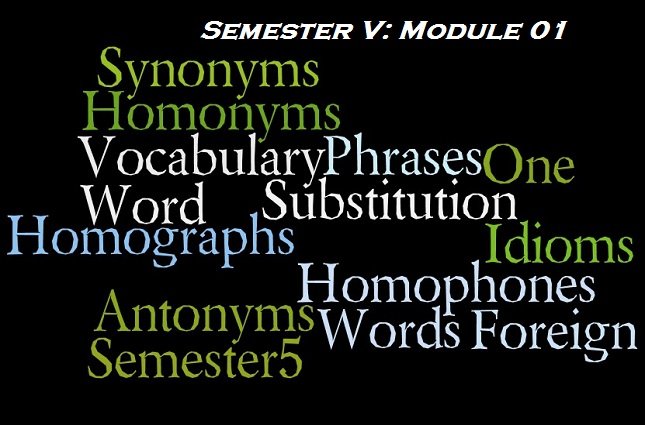Communication Skills are made up of Four Skills: Listening, speaking, reading, and Writing. These four are divided into two: Receptive (Listening and Reading) and Expressive (Speaking and Writing). It is said that the one who is skilled in all these skills is the learner who has a good 'VOCABULARY'.
Topics often studied and taught in Vocabulary:
- Define Vocabulary
- Significance of Vocabulary
- One Word Substitution, Synonyms & Antonyms
- Idioms & Phrases
- Define and Differentiate Homonyms, Homophones, and Homographs
- Vocabulary Drills
- Foreign Words in English
Vocabulary is generally known and practised as the 'sum total of words known' to the user. We know words and we understand them also. There is a path of learning between 'Knowing a Word and Understanding a Word'. Understanding a word enables me to use it, rather than utilise it freely in any given or possible context. Vocabulary is the stock of words we carry and keep on enhancing it with the passage of each day. Speaking and writing, the 'Expressive Skills' are based on the vocabulary we have. In fact, we need a good ACTIVE vocabulary for impressive Communication Skills.
Before moving ahead with our discussion on Vocabulary and the major aspects related to it, we need to know that Vocabulary is of two types: Active Vocabulary and Passive Vocabulary.
Active Vocabulary is the stock of words that we use without failure in terms of context and grammar. These words are understood by us, which is superior to knowing them. A user is able to use the 'Active' Vocabulary in any context and can make others learn how it is used.
Passive Vocabulary is the Non-Active Stock of Words. These are known to us, but we fall short in active usage. We recall them in specific situations when we put stress on recalling and understanding some written or spoken content. Passive Vocabulary on a person can also be defined as a 'hibernated' stock of words that gradually, With Practice, shifts to Active Vocabulary. Various exercises have been developed to enhance Vocabulary. We can even take help from the 'Smartphone Apps'.
The significance of Vocabulary: Do I really need to put effort into making you understand WHY YOU NEED Vocabulary? Being human, we need to exist through the act of expression and reception. We need to understand people by their spoken or written words and symbols. Each new day, we need to be more social than the previous one. Interacting with masses, forming relationships and maintaining a cordial bond at personal and professional levels, teaching, learning, business management, etc.- We need Vocabulary in all places. It can not be denied that Vocabulary makes Communication and Communicators as well. Vocabulary makes us "Linguistically Competent".
Let us discuss the course-related segments of Vocabulary now:
One Word Substitution
One Word speaks for a descriptive clause, phrase, or even a sentence. To bring conciseness, we use one-word substitutions. These words stand for the descriptions.
More than 1000 One Word Substitution: Click Here
See the Document shared below:
Synonyms & Antonyms
Synonyms are words that have the same meaning as the given word. These words serve to convey the sameness in meaning, not exactly the same, but understood to be the same in a controlled context of usage.
The definition is: a word or phrase that means exactly or nearly the same as another word or phrase in the same language, for example, shut is a synonym of close.
Antonyms: A Word OPPOSITE to another word in meaning. i.e. Good & Bad.
Define and Differentiate Homonyms, Homophones, and Homographs (ContentSrc)
homonym/homophone/homograph
This word set can be confusing, even for word geeks. Let's start with the basics.
A homograph is a word that has the same spelling as another word but has a different sound and a different meaning:
lead (to go in front of)/lead (a metal)
wind (to follow a course that is not straight)/wind (a gust of air)
bass (low, deep sound)/bass (a type of fish)
A homophone is a word that has the same sound as another word but is spelt differently and has a different meaning:
to/two/too
there/their/they're
pray/prey
Not so bad, right? The ending –graph means drawn or written, so a homograph has the same spelling (Like Twins, with a different personality). The phone ending means sound or voice, so a homophone has the same pronunciation. But here's where it gets tricky. Depending on whom you talk to, homonym means either:
A word that is spelt like another but has a different sound and meaning (homograph); a word that sounds like another but has a different spelling and meaning (homophone)
OR
A word that is spelt and pronounced like another but has a different meaning (homograph and homophone)
So does a homonym have to be both a homograph and a homophone, or can it be just one or the other? As with most things in life, it depends on whom you ask.
In the strictest sense, a homonym must be both a homograph and a homophone. So say many dictionaries. However, other dictionaries allow that a homonym can be a homograph or a homophone.
With so many notable resources pointing to the contrary, are we losing this strict meaning? What then will we call a word that is spelt and pronounced the same as another but has a different meaning? If a homonym retains all these meanings, how will readers know what is actually meant?
The careful writer would do well to follow the strict sense, ensuring his meaning is understood immediately.
To say it precisely:
HOMONYMS are words that sound alike but have different meanings. Homophones are a type of homonym that also sound alike and have different meanings but have different spellings.
HOMOGRAPHS are words that are spelt the same but have different meanings. Heteronyms are a type of homograph that is also spelt the same and have different meanings, but sound different.
..................................................................................................................................................................
Foreign Words: English is filled with words that have been derived from many other languages of the world. These words carry the same meaning as they have in the parent language. From Legal to Literature, all domains of life have Foreign Words in their usage now. Examples: sine die: Without fixing a date, vice versa: in the opposite way, per capita: per head, magnum opus: greatest work or masterpiece.
Idioms and Phrases:
We know them!!!
Let me share some examples:
- To set one's house in order: to manage one's own affairs
- Ups and Downs: Prosperity and Adversity
- To turn the tables: To reverse someone's position
- At the eleventh hour: At the last moment
- A Sheet Anchor: the most reliable support
Suggested Readings:
Vocabulary Drill-Exercise-Workbook







